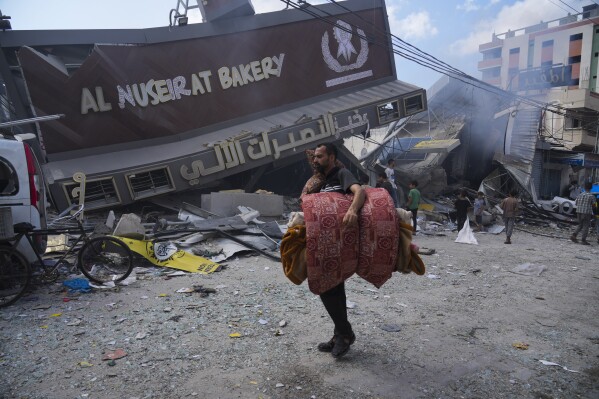
Israeli aircraft relentlessly bombarded parts of the Gaza Strip, including areas in the south that Palestinians had been advised to evacuate to, in a series of strikes that continued into Saturday.
This escalation followed the United States’ veto of a United Nations resolution calling for an immediate humanitarian ceasefire in Gaza. The resolution had the backing of most Security Council members and numerous other countries but was rejected in a 13-1 vote, with the United Kingdom abstaining.
U.N. Secretary-General Antonio Guterres described the attacks as “intense, continuous and widespread” prior to the vote. He expressed concern about the dire situation in Gaza, where residents are being forced to move around like “human pinballs”, seeking refuge in ever-shrinking areas of the south without access to basic necessities.
Guterres warned that the humanitarian support system in Gaza was on the brink of total collapse, which could have “devastating consequences for the security of the entire region.”
READ ALSO: Edo 2024: Obaseki’s Anointed Candidate Resigns As NB Board’s Chair To Pursue Politics
With Gaza’s borders with Israel and Egypt effectively closed, Palestinians have no choice but to seek shelter within the territory. The Health Ministry in the Hamas-controlled territory reported that the Palestinian death toll in Gaza has exceeded 17,400, with the majority being women and children. The ministry does not distinguish between civilians and combatants in its counts.
Israel blames Hamas for the civilian casualties, accusing the group of using civilians as human shields. Israel maintains that it has made significant efforts to evacuate civilians to safety. Israeli Defense Minister Yoav Gallant argued that a ceasefire would be tantamount to rewarding Hamas, disregarding the hostages in Gaza, and sending a signal to terrorist groups everywhere.
A delegation of foreign ministers, primarily from Arab countries and Turkey, visited Washington to urge the U.S. to withdraw its objections to an immediate ceasefire. Jordanian Foreign Minister Ayman Safadi, speaking ahead of a meeting with U.S. Secretary of State Antony Blinken, labeled Israel’s bombardment and blockade of Gaza as a war crime that is destabilizing the region.
Turkish Foreign Minister Hakan Fidan criticized the U.S. veto, stating that it demonstrated Washington’s isolation. He accused the American political system of being powerless on issues related to Israel, leading to reckless actions and continued oppression by Israel.
Fidan, along with foreign ministers from Palestine, Saudi Arabia, Indonesia, Egypt, Jordan, Qatar, and Nigeria, met with Blinken to advocate for an end to the conflict. The group is also scheduled to meet with Canadian Prime Minister Justin Trudeau and Foreign Minister Melanie Joly on Saturday.
As hostilities resumed following a brief ceasefire over a week ago, the U.S. called on Israel to do more to safeguard civilians and allow more aid into besieged Gaza. These appeals were made as Israel intensified its air and ground offensive into southern Gaza, particularly Khan Younis, causing tens of thousands more to flee.
Taha Abdel-Rahman, a resident of Khan Younis, described the situation as a night of intense gunfire and shelling, a common occurrence. Overnight airstrikes were reported in the Nuseirat refugee camp, where a family home was hit, resulting in casualties, according to resident Omar Abu Moghazi.
Israel has designated a narrow strip of barren coastline in the south, Muwasi, as a safe zone. However, Palestinians who have sought refuge there have reported dire conditions, with severe overcrowding, inadequate shelter, and poor sanitation facilities.
One Palestinian described the situation as living in harsh cold with no bathrooms and sleeping on the sand, saying, “We didn’t see anything good here at all.”








Leave a Reply